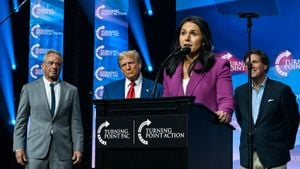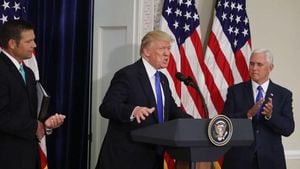Washington D.C. saw significant changes recently as the National Labor Relations Board (NLRB) declared mandatory anti-union meetings, often referred to as "captive audience meetings," unlawful. This ruling marks the end of over 75 years of legal precedent allowing employers to compel workers to attend these meetings, where management often pushes anti-union narratives. The decision stems from complaints related to Amazon’s practices at its Staten Island warehouse, which had recently voted to unionize.
The NLRB’s ruling came after votes were cast by workers at Amazon’s LDJ5 sortation center to form the Amazon Labor Union back in 2022. The Board criticized how these meetings effectively coerced employees under the threat of discipline for non-attendance. NLRB Chairman Lauren McFerran stated, "Today’s decision establishes protections for workers’ freedom to exercise their rights without feeling compelled to hear their employer’s viewpoint under duress."
Under the new ruling, companies can still express their views about unionization, but they must notify employees beforehand and clarify the voluntary nature of attendance. The Board emphasized it is now mandatory for companies to assure workers they won’t be penalized for choosing not to attend.
McFerran added, "Captive audience meetings undermine the fundamental goal of the National Labor Relations Act, which is to give employees the freedom to make genuine choices about union representation." The modifications are expected to significantly impact union organizing efforts across the nation, particularly at large corporations like Amazon, which have faced criticism for their anti-union activities.
The ruling was passed with a 3-1 vote, indicating strong support for the decision among the Board members. While it doesn’t retroactively apply to past meetings, it sets a firm guideline for future cases involving union-related discussions. This shift received varied reactions from labor advocates.
Liz Shuler, the president of AFL-CIO, celebrated the ruling as a significant win for workers, asserting, "This ruling restores the freedom workers deserve to make their own choices about union representation without any intimidation from their employers." Shuler expressed concern over the coercive nature of past meetings and voiced hope for future union organizing.
On the flip side, some labor organizers remain skeptical. Jaz Brisack, part of the Starbucks Workers United movement, warned about potential loopholes. She argued, "While the NLRB’s ruling may seem advantageous, this is still subject to interpretation by employers, who can adapt methods to gauge union support subtly through segregated meetings and even informal discussions. The core issue of coercion isn't being fully addressed."
Even with this legal progress, it seems the battle isn’t over for unions. There is concern among activists about potential changes if there’s a shift in the political climate following the 2024 Presidential elections, particularly if Donald Trump returns to office and appoints new NLRB members, who may look to overturn current rulings.
Overall, the recent NLRB ruling signals hope for those advocating for labor rights and can significantly affect how union campaigns are conducted, especially at large corporations. The move reflects the Board’s commitment to uphold the rights of workers and restore integrity to the organizing process. Companies, especially those like Amazon which have faced fierce criticism over its anti-union tactics, may need to reevaluate their strategies, paving the way for more equitable labor practices moving forward.
With this new ban on captive audience meetings, advocates will be watching closely to see how these changes play out across various sectors. Will companies respect these updated guidelines, or will they seek alternative ways to discourage unionization? The labor movement seems to be entering another pivotal moment, and the outcome could redefine workplace dynamics for years to come.



